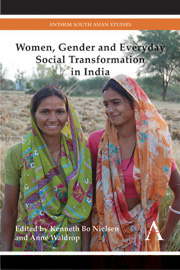Book contents
- Frontmatter
- Contents
- Acknowledgments
- Women and Gender in a Changing India
- PART I WORK, TECHNOLOGY, ASPIRATIONS
- PART II DEMOCRACY AND THE DEVELOPMENTAL STATE
- PART III ASSERTIONS AND ACTIVISM
- Chapter Eleven New Subalterns? Feminist Activism in an Era of Neoliberal Development
- Chapter Twelve Family, Femininity, Feminism: ‘Structures of Feeling’ in the Articulation of Men's Rights
- Chapter Thirteen Women's Activism in the Singur Movement, West Bengal
- Chapter Fourteen The Women's Question and Indian Maoism
- Chapter Fifteen Caste and Class in Gendered Religion: Dalit Women in Chennai's Slums
- About the Editors and Contributors
Chapter Eleven - New Subalterns? Feminist Activism in an Era of Neoliberal Development
from PART III - ASSERTIONS AND ACTIVISM
Published online by Cambridge University Press: 05 October 2014
- Frontmatter
- Contents
- Acknowledgments
- Women and Gender in a Changing India
- PART I WORK, TECHNOLOGY, ASPIRATIONS
- PART II DEMOCRACY AND THE DEVELOPMENTAL STATE
- PART III ASSERTIONS AND ACTIVISM
- Chapter Eleven New Subalterns? Feminist Activism in an Era of Neoliberal Development
- Chapter Twelve Family, Femininity, Feminism: ‘Structures of Feeling’ in the Articulation of Men's Rights
- Chapter Thirteen Women's Activism in the Singur Movement, West Bengal
- Chapter Fourteen The Women's Question and Indian Maoism
- Chapter Fifteen Caste and Class in Gendered Religion: Dalit Women in Chennai's Slums
- About the Editors and Contributors
Summary
The nationwide protests in the wake of the brutal gang rape of a 23-year-old student in New Delhi in December 2012 have renewed debates about feminism in India. While, for some, the near unprecedented display of public outrage was a welcome sign that feminism is alive and well in an Indian context, for others it signalled the absence of a genuine women's movement which was able to give voice and direction to such public anguish. The latter sentiment has in fact long been the presiding one among Indian feminists and leftists alike when considering the several major transformations in gender and feminist politics that have occurred in the course of India's globalization. These transitions have primarily been seen as signalling the decline if not death of the Indian women's movement (IWM) in the face of the ‘co-opting’ forces of the market and international development. This chapter reviews the debate about women's agency and scope for activism in an era of neoliberal development by taking as its point of departure the case of one subaltern feminist activist.
I focus on the narrative of a young woman who represents current trends of feminist mobilization in the eastern state of West Bengal. The region provides an interesting case study insofar as its feminist (nonparty) political ‘field’ (Ray 1999) has gone, in a dramatically short period of time, from being a largely homogenous one dominated by the Communist Party of India (Marxist) (CPI[M]) – which was hostile to foreign funding and feminism (Ray 1999) – to a more fragmented and dispersed one, spatially and organizationally. The activist story of the woman I call Sumana appears in this varied terrain, and while not representative of contemporary Indian feminism, it provides significant insights into the forms of activism that young subaltern women are involved in today. Insofar as such activism is located upon and negotiates a feminist field opened up largely by transnational developmentalism, it offers insights into the production of subjects – the ‘new subalterns’ (Spivak 2000; see below) – therein.
- Type
- Chapter
- Information
- Women, Gender and Everyday Social Transformation in IndiaA Revisionary History, pp. 175 - 188Publisher: Anthem PressPrint publication year: 2014



